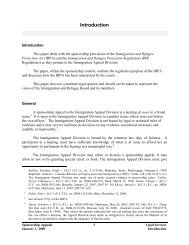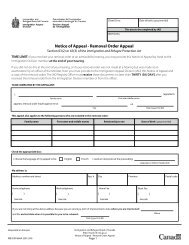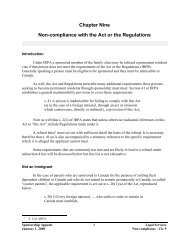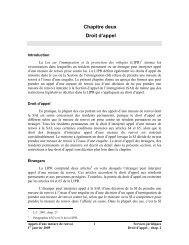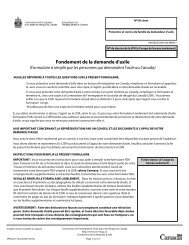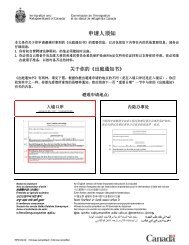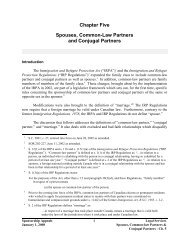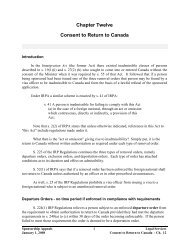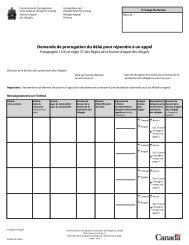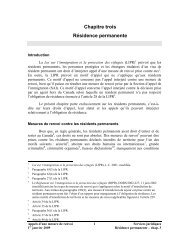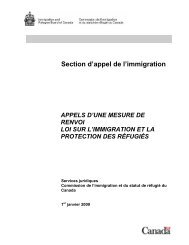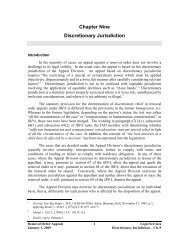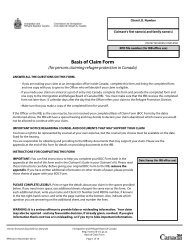Permanent Residence - Immigration and Refugee Board of Canada
Permanent Residence - Immigration and Refugee Board of Canada
Permanent Residence - Immigration and Refugee Board of Canada
You also want an ePaper? Increase the reach of your titles
YUMPU automatically turns print PDFs into web optimized ePapers that Google loves.
Chapter Three<strong>Permanent</strong> <strong>Residence</strong>IntroductionThe <strong>Immigration</strong> <strong>and</strong> <strong>Refugee</strong> Protection Act (IRPA) 1 provides that permanentresidents, protected persons <strong>and</strong> foreign nationals who are in possession <strong>of</strong> a permanentresident visa all have the right to appeal removal orders against them. 2 In addition, theIRPA provides for a ground <strong>of</strong> appeal which applies only to permanent residents. Theappeal is not against a removal order although it may result in the <strong>Immigration</strong> AppealDivision (IAD) making a removal order. The appeal is against a decision made by an<strong>of</strong>ficer outside <strong>Canada</strong> that a permanent resident does not meet the residency obligationfound in section 28 <strong>of</strong> the IRPA. 3.This chapter deals exclusively with permanent residents – their appeal rights,their status <strong>and</strong> their appeals concerning the residency obligation.Removal orders against permanent residentsNotwithst<strong>and</strong>ing the general principle that permanent residents have the right toenter <strong>and</strong> remain in <strong>Canada</strong> 4 , those rights are not absolute. Removal orders 5 may bemade against permanent residents if they are found inadmissible on any <strong>of</strong> a number <strong>of</strong>grounds: security, 6 violating human or international rights, 7 serious criminality, 8organized criminality, 9 misrepresentation, 10 failure to comply with any conditionsimposed by the regulations or failure to comply with the residency obligation in IRPA. 111<strong>Immigration</strong> <strong>and</strong> <strong>Refugee</strong> Protection Act, S.C. 2001, as amended.2IRPA, subsection 63(3).3IRPA, subsection 63(4).4IRPA, subsection 27(1).5The <strong>Immigration</strong> <strong>and</strong> <strong>Refugee</strong> Protection Regulations (IRP Regulations), SOR/2002-227, June 11, 2002(as amended) specify the types <strong>of</strong> removal orders to be made, depending on the ground <strong>of</strong>inadmissibility. Subsection 228(2) m<strong>and</strong>ates a departure order against a permanent resident reported forfailure to comply with the residency obligation. Other grounds <strong>of</strong> inadmissibility <strong>and</strong> the applicableremoval orders can be found in section 229.6IRPA, section 34.7IRPA, section 35.8IRPA, subsection 36(1).9IRPA, section 37.10IRPA, section 40.11IRPA, paragraph 41(b).Removal Order Appeals 1 Legal ServicesJanuary 1, 2009 <strong>Permanent</strong> <strong>Residence</strong> – Ch. 3
In accordance with subsection 44(2) <strong>of</strong> IRPA, a permanent resident may beordered removed only by the <strong>Immigration</strong> Division <strong>and</strong> not by the Minister, except inthe case <strong>of</strong> a breach <strong>of</strong> the residency obligation.Jurisdictional issuesA permanent resident enjoys a right <strong>of</strong> appeal to the <strong>Immigration</strong> AppealDivision (IAD) 12 unless the removal order is based on one <strong>of</strong> the first four groundslisted above. 13Thus there are two jurisdictional issues. The first one is whether the appellant isa permanent resident as defined in the IRPA.The question ... <strong>of</strong> determining whether a person is or is not apermanent resident is ... fundamental to the exercise <strong>of</strong> the board'sjurisdiction. 14The second issue is whether an appeal to the IAD is barred because the<strong>Immigration</strong> Division found the permanent resident inadmissible on one <strong>of</strong> the grounds 15enumerated in subsection 64(1) <strong>of</strong> the IRPA: security, violating human or internationalrights, serious criminality, or organized criminality.Acquisition <strong>and</strong> loss <strong>of</strong> permanent resident statusA permanent resident is defined as “a person who has acquired permanentresident status <strong>and</strong> has not subsequently lost that status under section 46 [<strong>of</strong> IRPA].” 16Section 46 <strong>and</strong> the loss <strong>of</strong> permanent resident status will be discussed in more detailbelow.Acquiring permanent resident status<strong>Permanent</strong> residence is still acquired in essentially the same way as it was underthe former <strong>Immigration</strong> Act (former Act) 17 although the term “l<strong>and</strong>ing” <strong>and</strong> “l<strong>and</strong>edimmigrant” used in the former Act has disappeared from the IRPA. The prescribedprocedure is for a person to apply outside <strong>Canada</strong> for a permanent resident visa to bepresented at a Canadian port <strong>of</strong> entry. The visa <strong>of</strong>ficer abroad issues the visa to anapplicant if the <strong>of</strong>ficer is satisfied that the applicant is admissible. At the port <strong>of</strong> entry, an12IRPA, subsection 63(3).13IRPA, section 64.14<strong>Canada</strong> (Minister <strong>of</strong> Employment <strong>and</strong> <strong>Immigration</strong>) v. Selby, [1981] 1 F.C. 273, 110 D.L.R. (3d) 126(C.A). Although this decision predates the IRPA, the principle remains unchanged.15In cases where the permanent resident is facing more than one removal order, the IAD has held thatthere is no right <strong>of</strong> appeal against a removal order where a second removal order (prior or subsequent) iscaught by s. 64. See, for example, Tiet v. M.C.I. (IAD WA6-00043), Workun, March 3, 2008.16IRPA, subsection 2(1).17<strong>Immigration</strong> Act, R.S.C., 1985, c. I-2, as amended.Removal Order Appeals 2 Legal ServicesJanuary 1, 2009 <strong>Permanent</strong> <strong>Residence</strong> – Ch. 3
immigration <strong>of</strong>ficer re-examines the visa holder to determine if he or she still meets therequirements <strong>of</strong> the Act. Once admitted by the immigration <strong>of</strong>ficer, the visa holderbecomes a permanent resident. 18Not everyone who acquires permanent residence starts the process from outside<strong>Canada</strong>. 19 Among the exceptions created by the Regulations are protected persons 20 <strong>and</strong>the “spouse or common-law partner in-<strong>Canada</strong>” class 21 , that specifically allow forapplications for permanent residence from within <strong>Canada</strong>, without the need to apply to beexempted from the requirement for a visa.Finally, there is one other way to become a permanent resident. It is described insubsection 46(2) <strong>of</strong> the IRPA <strong>and</strong> covers the more rarely seen situation <strong>of</strong> reverting topermanent resident status after ceasing to be a Canadian citizen under paragraph 10(1)(a)<strong>of</strong> the Citizenship Act. 22<strong>Permanent</strong> resident cardsUnder IRPA, everyone is issued a permanent resident card when they become apermanent resident. 23 <strong>Permanent</strong> residents who were l<strong>and</strong>ed before the card existed haveto apply for the permanent resident card, 24 so that they may be examined to determinewhether they are permanent residents. The cards (sometimes referred to as <strong>Canada</strong> cards)are provided or issued only in <strong>Canada</strong>. 25While permanent resident cards are evidence <strong>of</strong> permanent resident status, theirissuance does not confer status. The significance <strong>of</strong> permanent resident cards wasexplained by the Federal Court in Ikhuiwu:[…] the legislative scheme under the IRPA makes it clear that themere possession <strong>of</strong> a permanent resident card is not conclusive18IRPA, sections 20 <strong>and</strong> 21, <strong>and</strong> the IRP Regulations.19It is possible to apply under IRPA section 25 to be exempted on humanitarian <strong>and</strong> compassionategrounds from the usual requirements <strong>of</strong> the IRPA. In addition, the IRP Regulations allow certaincategories <strong>of</strong> persons apply for permanent residence from within <strong>Canada</strong>.20IRP Regulations, section 175. Protected persons are permitted to make applications to remain in <strong>Canada</strong>as permanent residents.21IRP Regulations, sections 123 – 129.22Citizenship Act, R.S.C., 1985, c. C-29. Under subsection 10(1) <strong>of</strong> the Citizenship Act, a person ceases tobe a Canadian citizen where his status was obtained or retained by false representation or fraud or byknowingly concealing material circumstances. Where citizenship is revoked under this provision, theperson reverts to the status <strong>of</strong> permanent resident unless the subsection 10(2) exception applies. Theexception deals with cases where the false representation, fraud or concealment related to the person’sadmission to <strong>Canada</strong> as a permanent resident.23IRPA, section 31 provides that permanent residents will be provided status documents. Section 53 <strong>of</strong> theIRP Regulations identifies that status document as a permanent resident card. IRP Regulations,paragraph 53(1)(a) indicates it will be provided to persons who become permanent residents underIRPA.24IRP Regulations, paragraph 53(1)(b).25IRP Regulations, section 55.Removal Order Appeals 3 Legal ServicesJanuary 1, 2009 <strong>Permanent</strong> <strong>Residence</strong> – Ch. 3
pro<strong>of</strong> <strong>of</strong> a person's status in <strong>Canada</strong>. Pursuant to section 31(2) <strong>of</strong>the IRPA, the presumption that the holder <strong>of</strong> a permanent residentcard is a permanent resident is clearly a rebuttable one. In this case,it is clear that the permanent resident card, which was issued inerror after it was determined by the visa <strong>of</strong>ficer in Nigeria that theapplicant had lost his permanent residence status, could notpossibly confer legal status on him as a permanent resident, norcould it have the effect <strong>of</strong> restoring his permanent resident statuswhich he had previously lost because he didn't meet the residencyrequirements. 26A person outside <strong>Canada</strong> who does not have the card is presumed not to havepermanent resident status. 27 Although a permanent resident card is not required within<strong>Canada</strong> <strong>and</strong> it also is not required to enter <strong>Canada</strong>, it is required by transportationcompanies to carry permanent residents who want to travel back to <strong>Canada</strong>. 28A permanent resident card is issued for different periods <strong>of</strong> validity depending onthe circumstances <strong>of</strong> the permanent resident. As a general rule, a permanent resident cardis valid for five years. 29 . However, the period <strong>of</strong> validity is limited to only one year if thestatus <strong>of</strong> the permanent resident is in the process <strong>of</strong> being re-examined. A card valid forone year will be issued to permanent resident waiting for a final determination <strong>of</strong> adecision made outside <strong>Canada</strong> on the residency obligation. 30 It is also issued for one yearwhere a subsection 44(1) report against a permanent resident has set into motion aprocess whose outcome has still to be finally determined. 31Loss <strong>of</strong> <strong>Permanent</strong> Resident StatusOnce acquired, permanent resident status can be lost in certain circumstances.Subsection 46(1) <strong>of</strong> the IRPA sets out the four ways in which permanent residents canlose their status.• if they become Canadian citizens 3226Ikhuiwu v. <strong>Canada</strong> (Minister <strong>of</strong> Citizenship <strong>and</strong> <strong>Immigration</strong>), 2008 FC 35, paragraph 19.27IRPA, paragraph 31(2)(b).28IRP Regulations, subsection 259(f) provides that a permanent resident card is a prescribed document forthe purposes <strong>of</strong> IRPA subsection 148(1). Paragraph 148(1)(b) prohibits transportation companies fromcarrying to <strong>Canada</strong> any person who does not hold a prescribed document.29IRP Regulations, subsection 54(1).30IRP Regulations, paragraph 54(2)(a).31IRP Regulations, paragraph 54(2)(b),(c) <strong>and</strong> (d).32IRPA, paragraph 46(1)(a). Under the <strong>Immigration</strong> Act, the effects <strong>of</strong> acquiring or losing Canadiancitizenship were included in the definition <strong>of</strong> permanent resident. Now, under the IPRA, they areincluded in section 46 on the loss <strong>of</strong> status.Removal Order Appeals 4 Legal ServicesJanuary 1, 2009 <strong>Permanent</strong> <strong>Residence</strong> – Ch. 3
• on a final determination <strong>of</strong> a decision made outside <strong>of</strong> <strong>Canada</strong> thatthey have failed to comply with the residency obligation undersection 28 <strong>of</strong> IRPA• when a removal order made against them comes into force 33• on a final determination under section 109 to vacate a decision toallow their claim for refugee protection or a final determinationunder subsection 114(3) to vacate a decision to allow theirapplication for protection.The first situation would raise no issues concerning the IAD’s jurisdiction, asCanadian citizens are not subject to removal orders or residency obligations.In the other circumstances enumerated in subsection 46(1), the IRPA ensuresthat permanent resident status will not be lost until the permanent resident has had anopportunity to contest the loss <strong>of</strong> status. Taking the example <strong>of</strong> removal orders forinstance, where, as in the case <strong>of</strong> permanent residents, there is a right <strong>of</strong> appeal, theremoval order does not come into force (<strong>and</strong> consequently the permanent residentretains status) until the appeal period expires, or if an appeal is filed, the day the appealis finally determined. 34 Retaining permanent resident status is critical to having a right<strong>of</strong> appeal to the IAD under subsections 63(3) or (4).Another way to lose permanent residence status is to voluntarily relinquish it.There are no statutory provisions dealing with voluntary relinquishment, but the CIChas developed procedures <strong>and</strong> forms 35 to deal with the practice which has also givenrise to some IAD case law. An issue <strong>of</strong> particular importance is whether a person whohas voluntarily relinquished permanent residence status can subsequently retract therelinquishment <strong>and</strong> assert his or her appeal rights as a permanent resident.One decision 36 <strong>of</strong> the IAD took the view that a relinquishment <strong>of</strong> status was tobe taken as written. The appeal was made by a permanent resident who was held indetention after being ordered removed. He signed a waiver <strong>of</strong> his right to appeal <strong>and</strong> aform IMM 5539B, Declaration: Relinquishment <strong>of</strong> <strong>Permanent</strong> Resident Status / Wherethe Residency Obligation is Met in order to gain his release <strong>and</strong> to be allowed to travelabroad. Once outside <strong>Canada</strong>, he filed an appeal arguing that his relinquishment shouldbe considered null <strong>and</strong> void because he had signed under duress. The member dismissedthe argument <strong>and</strong> the appeal, holding that the appellant had lost his status as apermanent resident, which meant that the tribunal did not have jurisdiction.33Section 49 <strong>of</strong> the IRPA sets out when a removal order comes into force.34IRPA, paragraph 49(1)(b).35OP 10 <strong>Permanent</strong> Residency Status Determination, Section 13 <strong>and</strong> Appendix C.36Hozayen, Aly Reda Mohamed v. M.C.I., IAD MA3-02470, Hudon, May 18, 2004.held that the appellanthad lost his status as a permanent resident.Removal Order Appeals 5 Legal ServicesJanuary 1, 2009 <strong>Permanent</strong> <strong>Residence</strong> – Ch. 3
Another IAD decision 37 illustrates a situation where it was not necessary toconsider the effect <strong>of</strong> a relinquishment or if it could be withdrawn. Regardless <strong>of</strong>whether or not the appellant had been successful in restoring his permanent residentstatus, there was no decision on his residency obligation or removal order against whichhe could appeal.13 No decision has been made outside <strong>Canada</strong> on the residencyobligation with respect to the appellant as the appellant signed a voluntaryrelinquishment <strong>of</strong> his permanent resident status in order to obtain thevisitor's visa.14 Section 63(3) <strong>of</strong> the IRPA indicates a permanent resident mayonly appeal to the IAD against a decision at an examination or admissibilityhearing to make a removal order against a permanent resident. This includesa removal order made for breaching the residency obligation.15 At this point in time, the appellant has no right <strong>of</strong> appeal to theIAD under section 63 (3) <strong>of</strong> the IRPA, as no removal order has been madeagainst him.A similar decision 38 involved an appellant who had signed a Declaration,Voluntary Relinquishment <strong>of</strong> <strong>Permanent</strong> Resident Status <strong>and</strong> Consent to a Decision onResidency Obligation <strong>and</strong> a Waiver <strong>of</strong> Appeal Rights Resulting in Loss <strong>of</strong> Status underA46(1)(b) which he submitted along with his Notice <strong>of</strong> Appeal. The member specificallywrote that he was leaving aside the issue <strong>of</strong> whether the appellant was still a permanentresident, <strong>and</strong> dismissed the appeal because the appellant had not submitted a copy <strong>of</strong> adecision made outside <strong>of</strong> <strong>Canada</strong> with respect to his residency obligation.The case law to date provides no definitive answer to the question <strong>of</strong> whether aperson can withdraw a voluntary relinquishment <strong>of</strong> permanent resident status,particularly if the person who made the decision to relinquish was fully aware <strong>of</strong> theconsequences.It is perhaps instructive to note that in the section on issuance <strong>of</strong> traveldocuments, the CIC’s Operational Manual on Overseas Processing (OP 10) does allowfor the possibility that permanent residents will change their minds about waiving theirappeal rights.Should applicants voluntarily declare that they have failed to complywith the A28 residency obligations, that they concur with the manager’snegative determination <strong>and</strong> voluntarily waive their right to appeal underA63(4), they still have 60 days to reconsider, change their mind <strong>and</strong> file anappeal. 3937Tosic, Milos v. M.C.I., (IAD TA5-07793), Waters, November 18, 2005.38El Hemaily, Mohamed Tarek v. M.C.I., (IAD TA7-08921), Waters, April 28, 2008.39OP 10, supra, footnote 35, subsection 16.3.Removal Order Appeals 6 Legal ServicesJanuary 1, 2009 <strong>Permanent</strong> <strong>Residence</strong> – Ch. 3
The IAD member in Sobrado 40 decision seems to indicate that a right <strong>of</strong> appealwould have existed if the appellant had withdrawn her relinquishment <strong>of</strong> permanentresident status within the time period allowed by CIC (30 days if there was an appealagainst a removal order; 60 days if a determination outside <strong>Canada</strong> was appealed).However, Ms. Sobrado apparently never informed the Minister that she wished towithdraw a relinquishment she had signed two days prior to filing a notice <strong>of</strong> appeal. Themember held that because the relinquishment was not withdrawn, the appellant was nolonger a permanent resident <strong>of</strong> <strong>Canada</strong> <strong>and</strong> consequently, had no right <strong>of</strong> appeal to theIAD. The appeal was dismissed for lack <strong>of</strong> jurisdiction,The residency obligationThe IRPA imposes a clearly defined residency obligation on permanentresidents, set out in section 28. A failure to comply with this requirement is a distinctground <strong>of</strong> inadmissibility under subsection 41(b).Although the former <strong>Immigration</strong> Act also had a physical residency requirement,absence from <strong>Canada</strong>, even for an extended period <strong>of</strong> time, did not lead to a losspermanent resident status unless it was determined that the permanent resident had theintention to ab<strong>and</strong>on <strong>Canada</strong> 41 . <strong>Permanent</strong> residents who remained outside <strong>Canada</strong> formore than half <strong>of</strong> any 12-month period were deemed to have ab<strong>and</strong>oned <strong>Canada</strong> as theirplace <strong>of</strong> permanent residence <strong>and</strong> the onus was on them to prove the contrary. Returningresident permits were, by statute, pro<strong>of</strong> <strong>of</strong> a lack <strong>of</strong> intention to ab<strong>and</strong>on <strong>Canada</strong> as apermanent residence. An adjudicator or an immigration <strong>of</strong>ficer determined whether or notthe permanent resident had lost status as a result <strong>of</strong> an intention to ab<strong>and</strong>on but the<strong>Immigration</strong> Act provided no corresponding ground <strong>of</strong> inadmissibility. The old case lawunder the <strong>Immigration</strong> Act regarding the intention to ab<strong>and</strong>on is no longer relevant toappeals in law, as the IRPA has made the determination <strong>of</strong> compliance with the residencyobligation, for most cases, a matter <strong>of</strong> simple arithmetic. However, the concept <strong>of</strong>ab<strong>and</strong>onment is still relevant to the IAD’s exercise <strong>of</strong> humanitarian <strong>and</strong> compassionatediscretion in residency obligation appeals.Under the IRPA, when the residency obligation is not met, a permanent residentin <strong>Canada</strong> may be reported as inadmissible <strong>and</strong> issued a departure order. 42 If thepermanent resident has requested travel documents or has otherwise come to theattention <strong>of</strong> Canadian authorities outside <strong>Canada</strong> <strong>and</strong> a decision is made outside <strong>Canada</strong>that a permanent resident has not complied with the residency obligation nordemonstrated humanitarian <strong>and</strong> compassionate considerations that would overcome thebreach 43 , no removal order is made; the applicant receives a letter setting out the40Sobrado, Adelia Maria Alves v. M.C.I. (IAD TA6-03391), Ross, March 30, 2007.41<strong>Immigration</strong> Act, section 24.42See footnote 5.43IRPA, paragraph 28(2)(c) The <strong>of</strong>ficer is required to consider <strong>of</strong> humanitarian <strong>and</strong> compassionate factorsbefore making a determination.Removal Order Appeals 7 Legal ServicesJanuary 1, 2009 <strong>Permanent</strong> <strong>Residence</strong> – Ch. 3
negative determination. In both cases, the permanent resident has the right to appeal tothe IAD. 44An appellant can challenge the legal validity 45 <strong>of</strong> a residency obligationdecision. In addition, the IRPA exp<strong>and</strong>ed the jurisdiction <strong>of</strong> the IAD so that it is able toexercise humanitarian <strong>and</strong> compassionate discretion in residency obligation appeals.Section 28 <strong>of</strong> the IRPAThe residency obligation is an ongoing obligation that must be met by permanentresidents in order to maintain their status. Basically, for at least 730 days (2 years) inevery 5 year period, 46 a permanent resident must be either physically present in <strong>Canada</strong>, 47or outside <strong>Canada</strong> in certain defined situations. <strong>Permanent</strong> residents outside <strong>Canada</strong> mustbe either:• employed on a full-time basis by a Canadian business or in the public service<strong>of</strong> <strong>Canada</strong> or a province; 48• accompanying a Canadian citizen who is their spouse or common-law partneror, in the case <strong>of</strong> a child, their parent; 49 or• accompanying a permanent resident who is their spouse or common-lawpartner or, in the case <strong>of</strong> a child, their parent who is employed on a full-timebasis by a Canadian business or in the public service <strong>of</strong> <strong>Canada</strong> or <strong>of</strong> aprovince; (emphasis added). 50In order to be “accompanying,” the permanent resident must be ordinarilyresiding with their specified family member. 51 If the permanent resident isaccompanying a permanent resident specified family member, that family member mustalso comply with the residency obligation. 5244IRPA, subsection 63(3) where there was a removal order, or 63(4) if the decision was made outside<strong>Canada</strong>.45IRPA, paragraphs 67(1)(a) <strong>and</strong> (b).46IRPA, paragraph 28 (2)(a). The starting point to count back five years.47IRPA, subparagraph 28 (2)(a)(i).48IRPA, subparagraph 28 (2)(a)(iii).49IRPA, subparagraph 28 (2)(a)(ii).50IRPA, subparagraph 28 (2)(a)(iv).51IRP Regulations, subsection 61(4): For the purposes <strong>of</strong> subparagraphs 28(2)(a)(ii) <strong>and</strong> (iv) <strong>of</strong> the Act<strong>and</strong> <strong>of</strong> this section, a permanent resident is accompanying outside <strong>Canada</strong> a Canadian citizen or anotherpermanent resident – who is their spouse or common-law partner or, in the case <strong>of</strong> a child, their parent –on each day that the permanent resident is ordinarily residing with the Canadian citizen or the otherpermanent resident.52IRP Regulations, subsection 61(5): For the purposes <strong>of</strong> subparagraph 28(2)(a)(iv) <strong>of</strong> the Act, thepermanent resident complies with the residency obligation as long as the permanent resident they areaccompanying complies with their residency obligation.Removal Order Appeals 8 Legal ServicesJanuary 1, 2009 <strong>Permanent</strong> <strong>Residence</strong> – Ch. 3
The IRP Regulations define “child,” 53 “Canadian business” 54 <strong>and</strong> “employed on afull-time basis by a Canadian business or in the public service <strong>of</strong> <strong>Canada</strong> or a province.” 55Among other things, a Canadian business cannot be a “business <strong>of</strong> convenience” that isused primarily for the purpose <strong>of</strong> meeting the residency obligation. 56If at the time <strong>of</strong> an examination by an <strong>of</strong>ficer, the person has been a permanentresident for less than five years, they will only have to show that they will be able to meetthe residency obligation for the five-year period right after they became a permanentresident. 57 In every other case, the <strong>of</strong>ficer looks at the five-year period immediatelybefore the examination. 58If the permanent resident is reported for failing to meet the residency obligation,or a decision is made outside <strong>Canada</strong> that they have not met the residency obligation, thecalculation <strong>of</strong> days stops running. 59 Those days will only be included in the calculation <strong>of</strong>the residency obligation if it is later determined that the obligation had been met. 60Although the method for calculating 730 days within a five-year period soundsstraightforward, it can become complicated if the permanent resident is found to havebreached the residency obligation more than once within a limited time. In one suchcase, 61 the appellant, a minor, had not complied with his residency obligation. The <strong>of</strong>ficer53IRP Regulations, subsection 61(6): For the purposes <strong>of</strong> subparagraphs 28(2)(a)(ii) <strong>and</strong> (iv) <strong>of</strong> the Act, achild means a child <strong>of</strong> a parent referred to in those subparagraphs, including a child adopted in fact, whohas not <strong>and</strong> has never been a spouse or common-law partner <strong>and</strong> is less than 22 years <strong>of</strong> age.54IRP Regulations, subsection 61(1): Subject to subsection (2), for the purposes <strong>of</strong> subparagraphs28(2)(a)(iii) <strong>and</strong> (iv) <strong>of</strong> the Act <strong>and</strong> <strong>of</strong> this section, a Canadian business is(a) a corporation that is incorporated under the laws <strong>of</strong> <strong>Canada</strong> or <strong>of</strong> a province <strong>and</strong> that has an ongoingoperation in <strong>Canada</strong>;(b) an enterprise, other than a corporation described in paragraph (a), that has an ongoing operation in<strong>Canada</strong> <strong>and</strong>(i) that is capable <strong>of</strong> generating revenue <strong>and</strong> is carried out in anticipation <strong>of</strong> pr<strong>of</strong>it, <strong>and</strong>(ii) in which a majority <strong>of</strong> voting or ownership interests is held by Canadian citizens,permanent residents, or Canadian businesses as defined in this subsection, or(c) an organization or enterprise created by the laws <strong>of</strong> <strong>Canada</strong> or a province.55IRP Regulations, subsection 61 (3): For the purposes <strong>of</strong> subparagraphs 28(2)(a)(iii) <strong>and</strong> (iv) <strong>of</strong> the Act,the expression “employed on a full-time basis by a Canadian business or in the public service <strong>of</strong> <strong>Canada</strong>or <strong>of</strong> a province” means, in relation to a permanent resident, that the permanent resident is an employee<strong>of</strong>, or under contract to provide services to, a Canadian business or the public service <strong>of</strong> <strong>Canada</strong> or <strong>of</strong> aprovince, <strong>and</strong> is assigned on a full-time basis as a term <strong>of</strong> the employment or contract to(a) a position outside <strong>Canada</strong>;(b) an affiliated enterprise outside <strong>Canada</strong>; or(c) a client <strong>of</strong> the Canadian business or the public service outside <strong>Canada</strong>.56IRP Regulations, subsection 61 (2).57IRPA, subparagraph 28(2)(b)(i).58IRPA, subparagraph 28(2)(b)(ii).59IRP Regulations, subsection 62(1).60IRP Regulations, subsection 62(2).61Wan, Lap Him Kris v. M.C.I. (IAD TA6-00276), Nahas, May 16, 2008.Removal Order Appeals 9 Legal ServicesJanuary 1, 2009 <strong>Permanent</strong> <strong>Residence</strong> – Ch. 3
however determined that humanitarian <strong>and</strong> compassionate considerations justified thebreach <strong>and</strong> the appellant was allowed to return to <strong>Canada</strong> as a permanent resident. A fewmonths later, he left <strong>Canada</strong> for a brief holiday. When he tried to return to <strong>Canada</strong>,another <strong>of</strong>ficer determined once again that the appellant was not in compliance with theresidency obligation. His appeal to the IAD was allowed, but it was on humanitarian <strong>and</strong>compassionate grounds. The residency determination was found to be valid in law as theappellant had not met the 730-day requirement in the five-year period prior to the newdetermination. The appellant received no special treatment in calculating the period asresult <strong>of</strong> the first <strong>of</strong>ficer’s decision.In another case, 62 the appellant who had been refused a travel document due to hisnon-compliance with the residency obligation appealed to the IAD. It was a member <strong>of</strong>the IAD who found that there were sufficient humanitarian <strong>and</strong> compassionateconsiderations to warrant the grant <strong>of</strong> special relief. The appellant left <strong>Canada</strong> after thatfirst appeal was allowed. He received a travel document on February 16, 2004 <strong>and</strong> spenta short time in <strong>Canada</strong>. When he applied for another travel document more than threeyears later, his application was refused <strong>and</strong> he appealed again to the IAD. The memberproceeded on the basis <strong>of</strong> the parties’ consensus was that it was appropriate to considerthe five-year period immediately after February 16, 2004, when the appellant regainedstatus as a permanent resident. Calculating the time that remained, the appellant could notaccumulate the 730 days required. The appeal was dismissed.Where an <strong>of</strong>ficer has determined that a permanent resident has not met theresidency obligation, the <strong>of</strong>ficer may decide that the breach has been overcome if in the<strong>of</strong>ficer’s opinion, taking into account the best interests <strong>of</strong> a child directly affected by thedetermination, humanitarian <strong>and</strong> compassionate considerations justify the retention <strong>of</strong>permanent resident status. 63 In addition, the IAD may allow an appeal on the basis <strong>of</strong>humanitarian <strong>and</strong> compassionate considerations. 64Challenges to Retrospective LegislationThe IAD has had to rule on numerous legal challenges 65 to the residencyobligation provisions being applied to persons who were permanent residents prior to theJune 28, 2002 implementation date <strong>of</strong> the IRPA. Where their physical presence in <strong>Canada</strong>fell short <strong>of</strong> the 730-day requirement, they argued that they should be entitled to preservetheir permanent resident status on the basis <strong>of</strong> the <strong>Immigration</strong> Act definition <strong>of</strong>62Ibrahim, Asim v. M.C.I. (IAD TA7-12585), Ross, August 5, 2008.63IRPA, paragraph 28(2)(c). The first decision by an <strong>of</strong>ficer in the Wan case, supra, footnote 61 is anexample.64IRPA, paragraph 67(1)(c). The first decision by the IAD in the Ibrahim case, supra, footnote 62 is anexample.65Most Charter challenges at the IAD have related to section 7 <strong>of</strong> the Charter, however in Chen, Wen v.M.P.S.E.P. (IAD VA5-00806), Mattu, February 26, 2007 <strong>and</strong> Lei, Manuel Joao v. M.C.I. (IAD VA4-01999), Mattu, July 20, 2006 the challenges also related to sections 12 <strong>and</strong> 15 <strong>of</strong> the Charter as well assection 1 <strong>of</strong> the Canadian Bill <strong>of</strong> Rights.Removal Order Appeals 10 Legal ServicesJanuary 1, 2009 <strong>Permanent</strong> <strong>Residence</strong> – Ch. 3
permanent resident which turned on whether there was an intention to ab<strong>and</strong>on <strong>Canada</strong> asa permanent residence.In the Kuan case, 66 the appellant argued that the IRPA did not clearly indicate thatit was intended to have retroactive effect. Consequently, the new legislation should notapply to deprive the appellant <strong>of</strong> his vested right to retain permanent resident status in theabsence <strong>of</strong> an intention to ab<strong>and</strong>on. The member rejected this argument. Parliament hadthe authority to take away accrued or vested rights if it did so in clear <strong>and</strong> unambiguousterms. In the member’s opinion, a clear intention could be found in section 328 <strong>of</strong> the IRPRegulations which dealt specifically with permanent residents under the former Act <strong>and</strong>the calculation <strong>of</strong> their residency obligation if they were outside <strong>Canada</strong> during specifiedperiods prior to or immediately following June 28, 2002.This issue was settled by the Federal Court in Chu 67 where the Court held that thelegislative scheme in the IRPA was retrospective. The Court found that the presumptionagainst retrospective or retroactive application <strong>of</strong> legislation was rebutted by the terms <strong>of</strong>the IRPA which repealed the former Act <strong>and</strong> unambiguously manifested Parliament’sintention that the IRPA applied to immigration matters as <strong>of</strong> June 28, 2002. The Courtalso found that the appellant had not suffered a loss <strong>of</strong> life, liberty or security undersection 7 <strong>of</strong> the Charter. The Federal Court <strong>of</strong> Appeal dismissed the appeal. Respondingto the two certified questions, the Court confirmed that the five-year period in section 28<strong>of</strong> the IRPA applied to periods prior to June 28, 2002 <strong>and</strong> that the retroactive application<strong>of</strong> section 28 did not breach section 7 <strong>of</strong> the Charter. 68Discretionary Relief in Residency Obligation AppealsThe IAD is able to exercise humanitarian <strong>and</strong> compassionate discretion inresidency obligation appeals which it dismisses in fact or in law. Subsection 63(4)appeals were a new type <strong>of</strong> appeal <strong>and</strong> even the subsection 63(3) removal order appealswere based on a new ground <strong>of</strong> inadmissibility, so it was not immediately obvious howthe IAD would exercise this discretion. It did not take long for the IAD to develop a body<strong>of</strong> case law that draws from the general principles relied upon <strong>and</strong> applied for manyyears. The Ribic factors 69 used in the context <strong>of</strong> appeals from removal orders to examine"all the circumstances <strong>of</strong> the case" <strong>and</strong> the Chirwa 70 st<strong>and</strong>ard are still considered usefulguides. 71 It is interesting to note that the intentions <strong>of</strong> permanent residents who have66See Kuan, Chih Kao James v. M.C.I. (IAD VA2-02440), Workun, September 24, 2003.67Chu, Kit Mei Ann v. M.C.I. (F.C., no. IMM-121-05), Heneghan, July 18, 2006; 2006 FC 893; reported2007 FCR 578.68Chu, Kit Mei Ann v. M.C.I. (F.C.A., no. A-363-06), Décary, Linden, Sexton, May 29, 2007; 2007 FCA205.69Ribic, Marida v. M.E.I. (IAB T84-9623), D. Davey, Benedetti, Petryshyn, August 20, 1985.70Chirwa v. <strong>Canada</strong> (Minister <strong>of</strong> Manpower <strong>and</strong> <strong>Immigration</strong>) (1970), 4 I.A.C. 338 (I.A.B.) at 350.71See, for example, Harding, Marcia v. M.C.I. (IAD TA4-18447), Collison, October 4, 2005 <strong>and</strong> Chan,Kwok Keung Franco v. M.C.I. (IAD TA6-16190), Mills, July 10, 2008.Removal Order Appeals 11 Legal ServicesJanuary 1, 2009 <strong>Permanent</strong> <strong>Residence</strong> – Ch. 3
een found not to have met their residency obligation, though not relevant in law, are<strong>of</strong>ten taken into account in the exercise <strong>of</strong> discretionary relief. 72The significance <strong>of</strong> factors considered in deciding whether equitable relief shouldbe granted in residency obligation appeals naturally varies from case to case <strong>and</strong> somefactors may overlap or need to be considered in conjunction with others. For example, anappellant who was absent from <strong>Canada</strong> for four years for a very good reason mightpresent a more compelling case for equitable relief than another appellant who missed theresidency obligation by only two months without any valid excuse. A non-exhaustive list<strong>of</strong> factors commonly considered includes the following:• the extent <strong>of</strong> the non-compliance with the residency obligation• the reasons for the departure from <strong>Canada</strong>• the reasons for continued or lengthy stay abroad 73• whether attempts to return to <strong>Canada</strong> were made at the first opportunity 74• the degree <strong>of</strong> establishment in <strong>Canada</strong>; both initial <strong>and</strong> continuing 75• family ties to <strong>Canada</strong> <strong>and</strong> whether they are sponsorable• hardship <strong>and</strong> dislocation that would be caused to the appellant <strong>and</strong> his/herfamily in <strong>Canada</strong> if the appellant were to be removed to his/her country <strong>of</strong>nationality• the best interests <strong>of</strong> any children directly involved 76• whether there are other unique or special circumstances that merit specialrelief.72See, for example, Wong, Yik Kwan Rudy v. M.C.I. (IAD VA2-03180), Workun, June 16, 2003 in whicha return to Hong Kong to put family affairs in order was unexpectedly extended due to a parent’sterminal illness. In Kok, Yun Kuen v. M.C.I. (IAD VA2-02277), Boscariol, July 16, 2003, theappellant’s “failure to demonstrate a past, present or a concrete intent <strong>and</strong> probability in the near futureto establish residency in <strong>Canada</strong>…” was an important factor in deciding that no special relief waswarranted.73There may be reasons beyond the appellant’s control that delayed the return.74This is <strong>of</strong>ten a factor in the case <strong>of</strong> minors who leave <strong>Canada</strong> with their parents. See, for example, Wan,supra, footnote 61. In that case, the member considered that the appellant, nine years old at the time hisparents took him back to China, had demonstrated his will to return to <strong>Canada</strong> at the first occasionavailable to him when he applied for a travel document at the age <strong>of</strong> seventeen.75See, for example, Thompson, Gillian Alicia v. M.C.I. (IAD TA3-00640), MacPherson, November 12,2003. The fact that an appellant was well-established in <strong>Canada</strong> before her residency obligation wasbreached, can be a positive factor in allowing discretionary relief.76See, for example, Konig, Andrew Daniel v. M.C.I. (IAD VA2-03202), Kang, November 17, 2003. Themember found that the best interests <strong>of</strong> developmentally h<strong>and</strong>icapped children would be served byallowing the appellant who assisted a community care facility where the children were living, to remainin <strong>Canada</strong>.Removal Order Appeals 12 Legal ServicesJanuary 1, 2009 <strong>Permanent</strong> <strong>Residence</strong> – Ch. 3
Return to <strong>Canada</strong> for appealAfter a removal order is made against a permanent resident, they may leave<strong>Canada</strong> while their appeal is pending. In the case <strong>of</strong> a decision made outside <strong>Canada</strong> onthe residency obligation, they may already be outside <strong>Canada</strong>.<strong>Permanent</strong> residents do not lose their status until there has been a finaldetermination <strong>of</strong> their appeal <strong>of</strong> their removal order. 77 Also, permanent residents do notlose their status when a decision is made outside <strong>Canada</strong> that they do not meet theresidency obligation. It is only when there has been a final determination <strong>of</strong> that decisionthat they lose their status. 78 Therefore an appellant may be able to return to <strong>Canada</strong> as apermanent resident during the appeal process. 79In cases where an appellant has returned to <strong>Canada</strong> <strong>and</strong> the appeal under s. 63(4)is dismissed the IAD must issue a removal order, 80 i.e. a departure order. 81Travel documentsHowever, under IRPA, a permanent resident is required to have a permanentresident card or a travel document if they wish to use a transportation company to travelto <strong>Canada</strong>. 82 Returning resident permits no longer exist under IRPA. 83 Instead, permanentresidents who are outside <strong>Canada</strong> <strong>and</strong> do not have a permanent resident card, may applyfor a travel document to allow them to return to <strong>Canada</strong>. In deciding whether to issue atravel document, the <strong>of</strong>ficer will consider whether the permanent resident has met theresidency obligation. The <strong>of</strong>ficer will issue a travel document to the permanent resident• if the permanent resident complies with the residency obligation;• the <strong>of</strong>ficer has determined that humanitarian <strong>and</strong> compassionate considerationsexist which overcome the breach <strong>of</strong> the residency obligation <strong>and</strong> justifyretaining permanent resident status; or77IRPA, paragraphs 46(1)(c) <strong>and</strong> 49(1)(c).78IRPA, paragraphs 46(1)(b).79IRPA, subsection 19(2) <strong>of</strong> provides: “an <strong>of</strong>ficer shall allow a permanent resident to enter <strong>Canada</strong> ifsatisfied following an examination on their entry that they have that status.” Subsection 27(1) <strong>of</strong> IRPAprovides: “a permanent resident <strong>of</strong> <strong>Canada</strong> has the right to enter <strong>and</strong> remain in <strong>Canada</strong>, subject to theprovisions <strong>of</strong> this Act.”80IRPA, subsection 69(3).81IRP Regulations, subsection 228(2): For the purposes <strong>of</strong> subsection 44(2) <strong>of</strong> the Act, if a removal orderis made against a permanent resident, who fails to comply with the residency obligation under s. 28 <strong>of</strong>the Act, the order shall be a departure order.82IRP Regulations, section 259 sets out the prescribed documents for the purposes <strong>of</strong> IRPA subsection148(1). Travel documents issued to permanent residents outside <strong>Canada</strong> <strong>and</strong> permanent resident cardsare prescribed documents under subsections 259(a) <strong>and</strong> 259(f) respectively.83Only transitional provisions in the IRPA Regulations, subsections 328(2) <strong>and</strong> (3) deal with returningresident permits <strong>and</strong> their effect on the calculation <strong>of</strong> the residency obligation.Removal Order Appeals 13 Legal ServicesJanuary 1, 2009 <strong>Permanent</strong> <strong>Residence</strong> – Ch. 3
• if the permanent resident was physically in <strong>Canada</strong> at least once in the 365days before the examination, <strong>and</strong> they have appealed a determination on theirresidency obligation that was made outside <strong>Canada</strong>, or the time period formaking their appeal has not expired. 84Given that these conditions, there is no guarantee that a travel document will beissued. There is no appeal against the refusal to issue the travel document.In the event that an appellant cannot otherwise return to <strong>Canada</strong>, a permanentresident who appeals a decision made outside <strong>Canada</strong> on the residency obligation maymake an application 85 under IAD Rules sections 43 <strong>and</strong> 46 86 for an order that theyphysically appear at the hearing. The IAD may, after considering submissions, <strong>and</strong> ifsatisfied that the presence <strong>of</strong> the permanent resident at the hearing is necessary, order thepermanent resident to physically appear at the hearing, in which case an <strong>of</strong>ficer shallissue a travel document for that purpose. If approved, the travel document will generallybe issued by CIC after the IAD has set a date for the hearing <strong>of</strong> the appeal.The fact that an appellant wishes to appear in person is not in itself a sufficientground for granting the order sought. 87 The IAD has dealt with applications to return in anumber <strong>of</strong> appeals <strong>and</strong> has made the following rulings:The appellant had established that there was an impediment to attending hishearing by way <strong>of</strong> teleconferencing where the appellant was hearing impaired <strong>and</strong>required the assistance <strong>of</strong> a sign language interpreter at his hearing. His counsel wouldalso require either a captionist <strong>and</strong> or an ASL interpreter. The application was granted. 88The application was denied where the only ground the appellant gave for theorder sought, was a desire to "be assured <strong>of</strong> being able to properly discuss the case <strong>and</strong>present his arguments...without any limitations or dependencies on technologies thatmight or might not be available". 89The application was denied where the request was made after one year hadelapsed from the filing <strong>of</strong> the notice <strong>of</strong> appeal <strong>and</strong> no reason was given why the appellanthad to be present in person. 9084IRPA, subsection 31(3).85IRPA, subsection 175(2): In the case <strong>of</strong> an appeal by a permanent resident under subsection 63(4), the<strong>Immigration</strong> Appeal Division may, after considering submissions from the Minister <strong>and</strong> the permanentresident <strong>and</strong> if satisfied that the presence <strong>of</strong> the permanent resident at the hearing is necessary, order thepermanent resident to physically appear at the hearing, in which case an <strong>of</strong>ficer shall issue a traveldocument for that purpose.86IAD Rules, section 46 provides for a written application to return to <strong>Canada</strong> to be made no later than 60days after the notice <strong>of</strong> appeal <strong>of</strong> the residency obligation decision is received by the IAD.87Alipanah, Abolfazl v. M.C.I. (IAD TA4-04349), Néron, September 15, 2004.88Al-Gumer, Nazer Jassim v. M.C.I. (IAD TA4-11257, Néron, November 16, 2004.89Pour, Nabi Mohammad Hassani v. M.C.I. (IAD TA4-04756), Boire, November 5, 2004.90Wu, Jui-Hsiunge et al. v. M.C.I. (IAD TA4-06696 et al.), Boire, July 11, 2005 (reasons signed August 4,2005).Removal Order Appeals 14 Legal ServicesJanuary 1, 2009 <strong>Permanent</strong> <strong>Residence</strong> – Ch. 3
An application based on counsel’s submission that it was essential that he <strong>and</strong> theappellant be physically together to review documents <strong>and</strong> otherwise prepare for thehearing was denied. 9191Boulier, Junko v. M.C.I. (IAD VA6-02910), Workun, February 16, 2007.Removal Order Appeals 15 Legal ServicesJanuary 1, 2009 <strong>Permanent</strong> <strong>Residence</strong> – Ch. 3
CASESAl-Gumer, Nazer Jassim v. M.C.I. (IAD TA4-11257, Néron, November 16, 2004 ----------------------------14Alipanah, Abolfazl v. M.C.I. (IAD TA4-04349), Néron, September 15, 2004 ----------------------------------14Boulier, Junko v. M.C.I. (IAD VA6-02910), Workun, February 16, 2007 --------------------------------------15Chan, Kwok Keung Franco v. M.C.I. (IAD TA6-16190), Mills, July 10, 2008---------------------------------11Chen, Wen v. M.P.S.E.P. (IAD VA5-00806), Mattu, February 26, 2007 ----------------------------------------10Chirwa v. <strong>Canada</strong> (Minister <strong>of</strong> Manpower <strong>and</strong> <strong>Immigration</strong>) (1970), 4 I.A.C. 338(I.A.B.) at 350--------------------------------------------------------------------------------------------------------11Chu, Kit Mei Ann v. M.C.I. (F.C., no. IMM-121-05), Heneghan, July 18, 2006; 2006 FC893; reported 2007 FCR 578 ---------------------------------------------------------------------------------------11Chu, Kit Mei Ann v. M.C.I. (F.C.A., no. A-363-06), Décary, Linden, Sexton, May 29,2007; 2007 FCA 205 ------------------------------------------------------------------------------------------------11El Hemaily, Mohamed Tarek v. M.C.I., (IAD TA7-08921), Waters, April 28, 2008---------------------------- 6Harding, Marcia v. M.C.I. (IAD TA4-18447), Collison, October 4, 2005 --------------------------------------11Hozayen, Aly Reda Mohamed v. M.C.I., IAD MA3-02470, Hudon, May 18, 2004 ----------------------------- 5Ibrahim, Asim v. M.C.I. (IAD TA7-12585), Ross, August 5, 2008-----------------------------------------------10Ikhuiwu v. <strong>Canada</strong> (Minister <strong>of</strong> Citizenship <strong>and</strong> <strong>Immigration</strong>), 2008 FC 35, paragraph 19-------------------- 4Kok, Yun Kuen v. M.C.I. (IAD VA2-02277), Boscariol, July 16, 2003 ------------------------------------------12Konig, Andrew Daniel v. M.C.I. (IAD VA2-03202), Kang, November 17, 2003-------------------------------12Kuan, Chih Kao James v. M.C.I. (IAD VA2-02440), Workun, September 24, 2003 --------------------------11Lei, Manuel Joao v. M.C.I. (IAD VA4-01999), Mattu, July 20, 2006 -------------------------------------------10Pour, Nabi Mohammad Hassani v. M.C.I. (IAD TA4-04756), Boire, November 5, 2004 --------------------14Ribic, Marida v. M.E.I. (IAB T84-9623), D. Davey, Benedetti, Petryshyn, August 20,1985 -------------------------------------------------------------------------------------------------------------------11Selby: <strong>Canada</strong> (Minister <strong>of</strong> Employment <strong>and</strong> <strong>Immigration</strong>) v. Selby, [1981] 1 F.C. 273,110 D.L.R. (3d) 126 (C.A) ------------------------------------------------------------------------------------------ 2Sobrado, Adelia Maria Alves v. M.C.I. (IAD TA6-03391), Ross, March 30, 2007 ----------------------------- 7Thompson, Gillian Alicia v. M.C.I. (IAD TA3-00640), MacPherson, November 12, 2003 -------------------12Tiet v. M.C.I. (IAD WA6-00043), Workun, March 3, 2008 -------------------------------------------------------- 2Tosic, Milos v. M.C.I., (IAD TA5-07793), Waters, November 18, 2005 ----------------------------------------- 5Wan, Lap Him Kris v. M.C.I. (IAD TA6-00276), Nahas, May 16, 2008 -------------------------------- 9, 10, 12Wong, Yik Kwan Rudy v. M.C.I. (IAD VA2-03180), Workun, June 16, 2003 ----------------------------------12Wu, Jui-Hsiunge et al. v. M.C.I. (IAD TA4-06696 et al.), Boire, July 11, 2005 (reasonssigned August 4, 2005) ---------------------------------------------------------------------------------------------14Removal Order Appeals 16 Legal ServicesJanuary 1, 2009 <strong>Permanent</strong> <strong>Residence</strong> – Ch. 3



